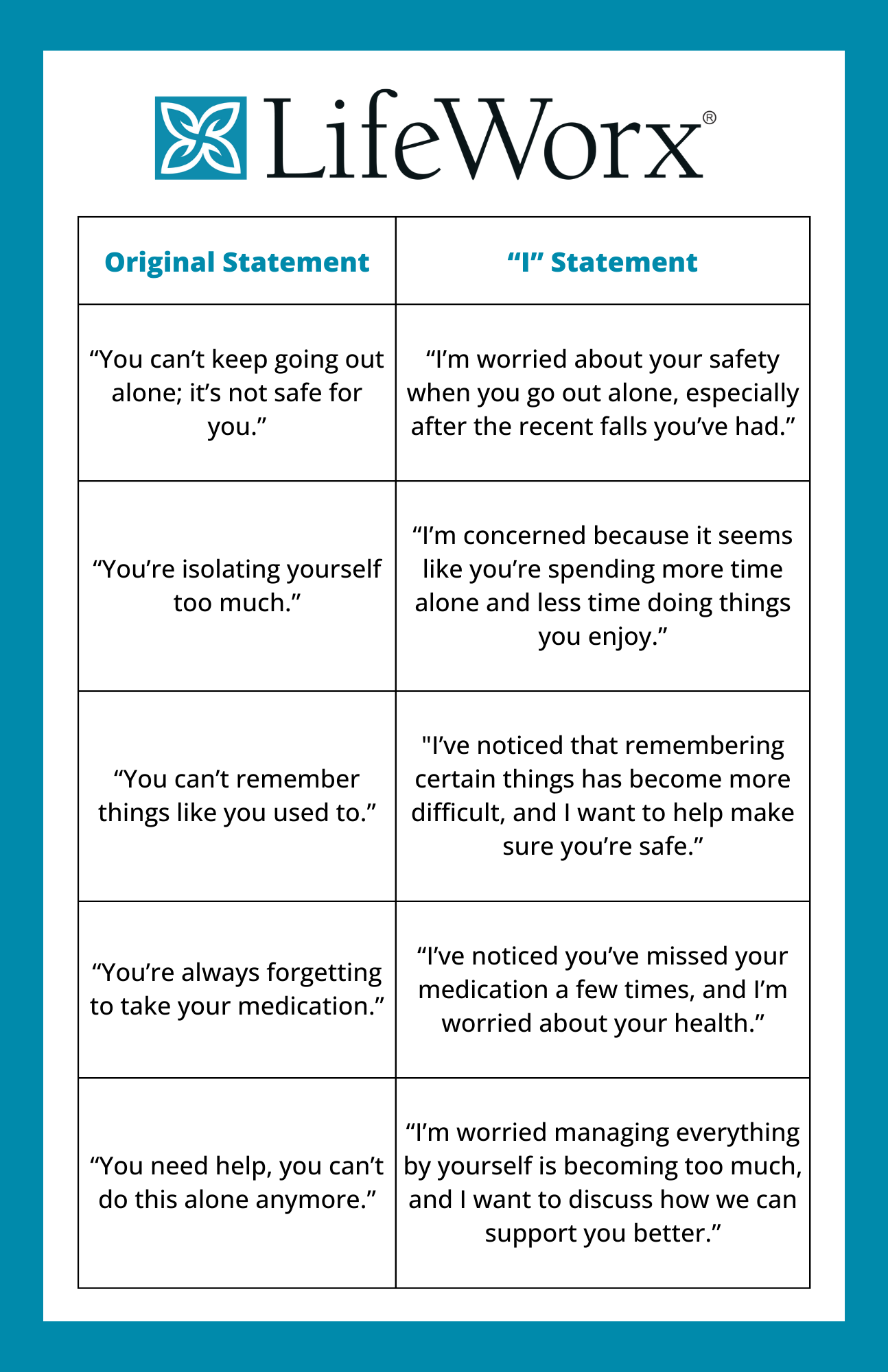
Talking About In-Home Care
Key Takeaways
- Starting conversations about in-home care can be emotional and met with resistance.
- Choosing the right time and tone helps keep the discussion respectful and calm.
- Focusing on safety, independence, and quality of life makes the benefits clearer.
- Listening to concerns builds trust and cooperation.
- LifeWorx offers compassionate care options that support dignity and comfort at home.
Realizing our parents or spouses need additional support can be emotional and overwhelming. Talking to loved ones about in-home care may feel even more daunting. Conversations about long-term care options, legal and financial details, and end-of-life preferences are uncomfortable, but procrastination and lack of communication can have serious consequences. Approaching these topics with empathy and careful planning will help your loved ones receive the care they need while maintaining their dignity and independence and make you feel reassured and prepared.
Recognize when it’s time to get care
Being proactive and responsible, the first step to addressing elder care is recognizing the signs that your loved one may need help. These signs manifest in many ways, and being attentive to changes in their physical, mental, and emotional health is key. One major determination is whether your loved one’s needs are medical or non-medical.
They may begin experiencing frequent falls or are struggling with mobility, making daily activities like dressing, showering, and eating more difficult. Chronic health conditions that require regular monitoring can also signal that additional care is needed. For instance, if your parent or spouse forgets to take their medication or can’t manage their diet correctly, it might be time to consider in-home care.
Changes in mental and emotional health are also important to observe. Disorientation and memory loss can be early signs of dementia or other cognitive impairments. If your loved one becomes withdrawn from social activities and is no longer as sociable as they once were, this could indicate that they may need more support.
Home safety is another major concern. If their home becomes unsafe due to clutter, poor lighting, or their inability to maintain household chores, it’s another sign that extra help is needed. For example, if your loved one has left the stove on multiple times or is no longer keeping up with their personal hygiene, these are risks that must be addressed.
Preparing for the conversation
When you realize that a loved one needs extra care, it’s important to prepare for the conversation ahead. Choose the appropriate time and place to minimize distractions. Pick a comfortable and private setting. Involving other family members can help you show a united and supportive front, reinforcing that the entire family wants what’s best for your loved one.
Take the time to gather comprehensive information about in-home care services so that you can provide well-informed suggestions and address any worries they may have. Understanding their needs and preferences will help you move the conversation in an effective and compassionate way.
Having the conversation about in-home care
Active listening is just as important as speaking. When you’re ready to start a conversation, acknowledge your loved one’s feelings and fears. If your parent or spouse is worried about losing their independence, talk to them about the benefits of in-home care, such as safety and companionship.
Reassure them that the goal is to improve their quality of life and not take away their independence. Highlight the support a caregiver can provide while allowing them to stay in the comfort of their home. For example, explain how a caregiver can help with daily activities, monitor their health, and provide companionship.
Most of us understand that communicating in compassionate ways is more effective than communicating with anger and frustration. However, even with a caring attitude, communication can still be unclear or misunderstood. Using “I” statements is an excellent way to avoid sounding accusatory, such as “I’m worried this could turn into something more serious.” These statements can help you express your concerns and feelings clearly and concisely while avoiding blame and defensiveness.

Handling resistance
It’s common for your loved one to have concerns about accepting care. Be prepared to face resistance. Recognize common fears and misconceptions about elder care. For instance, if your parent is worried about having a stranger in their home, assure them that caregivers are carefully screened and well-trained professionals. At LifeWorx, we have established thorough procedures to guarantee that all caregivers are trustworthy, reliable, and professional.
You might also want to suggest a trial period for in-home care services to help your loved one become more comfortable with the idea. Explain to them that they can take part in selecting their caregiver to ensure a good match. In some cases, involving a healthcare provider can add more credibility to the conversation.
Looking ahead
Once you’ve had the conversation, create a plan together. Make sure to include your loved one in the decision-making process. It’s important to assess their needs, adjust care as needed, and maintain open communication throughout the process. Continue to show love and support and let them know you are there for them every step of the way. LifeWorx experts are also available to answer any questions about the types of in-home care, scheduling, and caregiver matching.

















